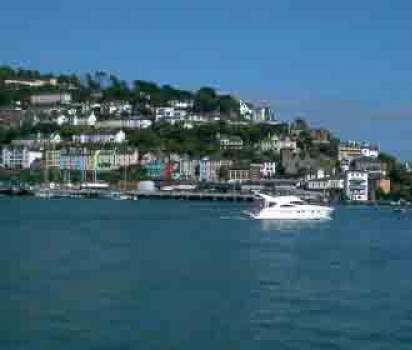Village Details:
Kingswear is the parish and village opposite Dartmouth. Several regular ferries cross the river and it is only a short drive to Brixham or Paignton. The Royal Dart Yacht Club is located in the village and there are a number of shops.
Kingswear as seen from Dartmouth. A lovely village and the terminus for the Torbay Steam Railway.
Kingswear is not mentioned in the Doomsday Book but there is reason to believe that Kingston, which is on the plateau above Kingswear, dates from Saxon times with some evidence of Stone Age and Roman occupation. After the conquest Kingston passed into the de Vasci family and the first documentary mention of Kingswear was around 1170 when William de Vinci gave half the land at Kingswear to the incumbent of the local church which was a chapel of ease to the parish church at Brixham and came under the jurisdiction of Totnes Priory. The name Kingswear may be associated with a tidal mill at the head of the creek with its system of weirs.
Why Dartmouth, on the opposite side of the river Dart, developed instead of Kingswear with its better communications to Exeter and London is unknown but it may be due to the attitude of the local lords of the manor and their ability to resist the demands of Totnes. Overseas pilgrims preferred Kingswear as a landing place on their way to the tomb of Thomas à Beckett in Canterbury and this probably gave rise to the dedication of the parish church to St Thomas of Canterbury. The church was rebuilt in 1847.
A ferry to Dartmouth operated from at least 1365 from Kittery Point, the western most tip of Kingswear and nearest to Dartmouth. Kittery was an area of the village south of the point now remembered in the house Kittery Court on the site of the former Kittery Quay. In 1636 Francis Champernowne sailed from here to the mouth of the Piscataqua River in Maine USA to found, with the Shapleigh family also from Kingswear, the town of Kittery.
The railway, with connections to Exeter and London, came to Kingswear in 1864 with the Royal Dart Hotel between the station and the ferry slipway providing accommodation for passengers waiting to sail to South Africa and elsewhere. The hotel occupied the site of the previous Plume of Feathers Inn and here the Royal Dart Yacht Club used to meet until its own club house was built next to Kittery Court. The proprietors of the inn adopted the name Royal Dart Hotel by which it is still known.
During the Second World War the hotel became HMS Cicala and headquarters of the 15th Flotilla which made journeys to the northern beaches of Brittany to land agents and equipment for the French Resistance and bring back escaping allied soldiers and airmen. The Free French Navy operated motor launches and motor torpedo boats from Kingswear and was based in Brookhill, a large house on the outskirts of the village dating from about 1820.
The harbour became a principal bunkering port for steam ships to take on coal brought to Kingswear both by sea and, following the opening of the Severn Tunnel providing access to the South Welsh mines, on the railway. However the bunkering trade suffered as ships became too large to enter the harbour. For a few years the trade continued with coal being brought into Kingswear by sea for transportation by rail to the gas works in Torquay but it ceased all together in 1963. In 1972 the railway from Paignton to Kingswear was sold and became the Dartmouth and Paignton Steam Railway and a holiday attraction. Although Dartmouth had a station, now the Station Café, it never had a railway and passengers were taken to Kingswear by ferry.
There are now three ferries between Kingswear and Dartmouth. The Lower Ferry from the slipway in the village takes cars and foot passengers; the passenger ferry from the nearby pontoon is the successor to the railway ferry connection Dartmouth Station to the Kingswear railway and the Higher Ferry which also takes cars and foot passengers and is accessed by a road which bypasses Kingswear village.
Further information can be found in:
Report and Transactions of the Devonshire Association 1953, pp56 – 85.
The Chronicles of Dartmouth by Don Collinson, published by Richard Webb 2000 The Newton Abbot to Kingswear Railway by C R Potts, published by the Oakwood press, Reg Little's recollections of the War Years can be found on the Devon County Council site at www.devon.gov.uk/library/locstudy/test-lit2

